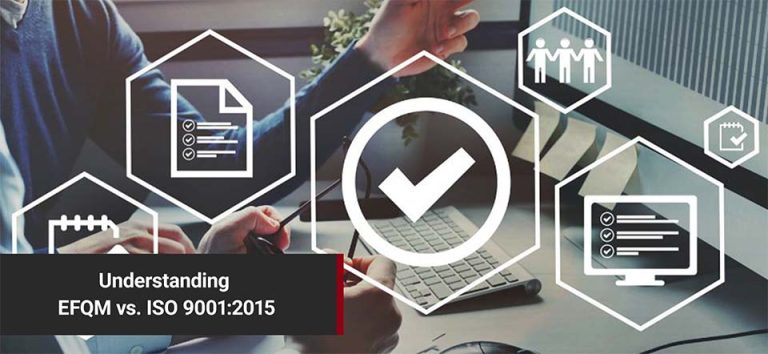Navigating Quality Management System Standards (ISO 9001 vs. EFQM)
Quality is a critical aspect of organizational success, because it directly impacts various facets of an organization, including customer satisfaction, reputation, operational efficiency, and overall competitiveness. To maintain high quality and high standards of efficiency and effectiveness; several management standards can be implemented in an organization. Two prominent frameworks in this domain are the EFQM (European Foundation for Quality Management) Excellence Model and the ISO 9001:2015 Quality management systems. In this blog, you’ll explore the key differences and similarities between EFQM and ISO 9001:2015.
EFQM, striving for Excellence
The EFQM Excellence Model, developed by the European Foundation for Quality Management, is a holistic framework that focuses on achieving organizational excellence. Unlike the ISO 9001:2015, which is a standard with a specific set of requirements, EFQM provides a more comprehensive approach to quality management.
Key Aspects of EFQM:
- Radical Focus on Excellence: The excellence model encourages organizations to go beyond mere compliance and actively pursue excellence in all aspects of their operations.
- 9 Criteria for Excellence: The excellence model comprises nine criteria, including;
- Leadership
- Strategy
- People
- Partnerships
- Resources
- Processes
- Products & services
- Customer results, people results and society results
- Key Performance Results
These criteria cover a broad spectrum of organizational functions, ensuring a holistic approach to quality management.
3. Continuous Improvement: The excellence model places a strong emphasis on continuous improvement, pushing organizations to evolve and adapt to changing environments.
ISO 9001:2015, Meeting Quality Standards
ISO 9001:2015 is a globally recognized standard, developed by the International Organization for Standardization (ISO). It is more specific in its requirements and focuses on ensuring that organizations meet customers’ needs and regulatory quality standards. The standard follows a high-level structure known as the Annex SL, which is designed to facilitate integration with other management system standards. This common structure enhances compatibility with standards like ISO 14001:2015 (environmental management system) and ISO 45001:2018 (occupational health and safety management system).
Key Aspects of ISO 9001:
- Customer-Centric Approach: The standard places a significant emphasis on understanding and meeting customers’ requirements, and ensuring customers’ satisfaction through providing consistent product / service quality.
- Process Oriented: The standard requires organizations to establish and maintain a set of well-defined processes, encouraging a systematic approach to quality management.
- Risk-Based Thinking: The standard adopts risk-based approach, prompting organizations to identify and mitigate potential risks that could impact the quality of their products / services.
Which One to Choose, EFQM vs. ISO 9001:
While both EFQM and ISO 9001:2015 aim to enhance organizational performance and quality, the choice between them depends on the specific needs and goals of an organization.
- EFQM, ideal for organizations aspiring to achieve excellence, foster innovation, and embrace a holistic view of quality management.
- ISO 9001:2015, suitable for organizations seeking to establish and demonstrate their commitment to quality and customer satisfaction through implementing a specific set of requirements.
Conclusion: Striking the Right Balance
In conclusion, the choice between the model and the standard to be implemented in an organization depends on the organization’s strategic objectives and its desired level of commitment to quality management. Adopting ISO 9001:2015 can benefit organizations by enhancing their efficiency, customer satisfaction, and overall performance. It provides a systematic approach to quality management that can be applied across various industries and sectors. On the other hand, EFQM Excellence Model is a holistic and flexible tool that supports organizations in their journey towards continuous improvement and excellence. It aligns with the principles of total quality management and organizational excellence, emphasizing a systematic approach to managing processes and fostering a culture of innovation and learning.
Some organizations may even opt for a hybrid approach, combining elements of both frameworks to create a customized quality management system. And regardless of the chosen path, it’s crucial for organizations to understand the nuances of each framework, ensuring that their quality management practices align with their overall business strategy.
By navigating the landscape of EFQM and ISO 9001, organizations can pave the way for sustained success and continuous improvement.
For more insights into quality management systems and best practices, feel free to connect with us through our website or via email.


